Carl E. Olson's Blog, page 130
September 24, 2013
One Buck, One Book, One Chance to Change a Life Forever

This Christmas, give your parishioners the book that can change their lives forever.
Dear Friends of Ignatius Press,
I would like to share an amazing evangelizing opportunity that our friends at Lighthouse Catholic Media have created. It's a collaborative effort with Ignatius Press. Please read the email below and share it with your parish priests and others in parish leadership, as well as with your family and friends.
As I am sure you know, Scott and Kimberly Hahn's conversion story book, Rome Sweet Home, has touched so many people over the years. Non-Catholics have converted, Catholics have deepened their faith and have helped convert others. Although the book has been a tremendous "bestseller", we believe the story has only just begun to reach many ordinary Catholics in the pews. Through this collaborative effort with our friends at Lighthouse, we would like to change that.
Imagine every family in your parish receiving a copy of Rome Sweet Home. Imagine the impact that can have. Indeed, imagine what it could do to evangelize and catechize the people of your parish.
We would like to help you do more than imagine it. We'd like to help make it a reality. The email message below gives the details. I urge you to talk to your pastor and others about this important effort.
In the Lord,
Mark Brumley
President

"As one who recently started 'paying attention' to my Catholic Faith and to the Church, I couldn't put this book down."
Mike - San Francisco, CA
LEARN MORE
The book and CD are also available in Spanish!
Contact your Account Manager to place your pre-sale order today.
Or visit the website to learn more or order in minutes.
Copyright © 2013 Lighthouse Catholic Media, All rights reserved
Our mailing address is:
Lighthouse Catholic Media
303 E. State Street
Sycamore, IL 6017
"One of the beautiful and bright-shining stars in the firmament of hope for our desperate days is this couple, the Hahns, and this story of their life and their conversion."
- Dr. Peter Kreeft
September 23, 2013
Make a Joyful Noise Unto the Lord, All Ye Sisters

Make a Joyful Noise Unto the Lord, All Ye Sisters | Christopher S. Morrissey | Catholic World Report
A chart-topping album from the Dominican Sisters of Mary, Mother of the Eucharist serves up beauty so we may open our hearts to God.
These are the sisters who
surprised even Oprah. Exuberant and radiant, the Dominican Sisters of Mary, Mother of the Eucharist have been shining
their light in the most surprising cultural venues. Oprah herself was amazed to learn about how young women have
been attracted to this vibrant community, bursting with vocations, where the
average age is under 30. Now as always, vows of poverty, chastity, and
obedience bear fruitful witness. A life fully devoted to prayer and apostolic
service is ever beautiful.
Capitalizing
on that earlier media attention from daytime television, the sisters have just
now released Mater
Eucharistiae, a
highly successful album of sacred music that has quickly ascended the classical
charts since its release in August. Its calm and contemplative beauty brings
the listener into the aural space where the sisters themselves pray daily. By
sharing some of their favorite sacred music with the world, they make striking
use of modern media to issue a special invitation. They want everyone to open
their hearts to the peace and joy that they have discovered. This music is the
way of beauty by which
they make their appeal.
The sisters are a community of
consecrated women canonically established in 1997 by Cardinal John O’Connor of
New York. The Dominican Sisters of Mary, Mother of the Eucharist follow the
monastic observance given to them by their tradition. This Dominican tradition
encompasses both common life and cloister. Thus they experience times of
silence on a daily basis, as well as sing the Divine Office and attend daily
Mass. In addition, the sisters have an active charism that blooms forth in
their love for education and the formation of the young. They teach in and
administer small, private Catholic schools, such as the Spiritus Sanctus
Academies in Michigan.
Clearly, these Dominican sisters
have used prayerful discernment and deployed their gifts wisely and judiciously
with their album release. This simple and humble offering of a selection of
music—a musical window into their life of joy—has obviously moved many people.
I hope you will buy copies not only for yourself, but also as quiet and
unassuming gifts to give to anyone. You never know what response a surprise
gift may evoke. The sisters’ music could stir up a surprising response in someone’s
heart.
What
will someone hear when they play this album?
Prayer and Martyrdom are Mightier than the Sword
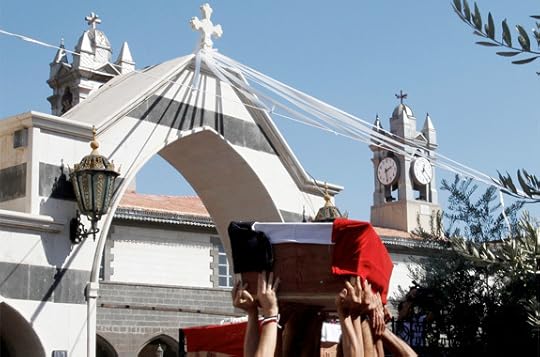
Mourners
carry the coffins of three men into a church for their funeral in
Damascus, Syria, Sept. 10. The Christian men were killed during a raid
by opposition fighters on Maloula village northeast of Damascus. (CNS
photo/Khaled al-Hariri, Reuters)
Prayer
and Martyrdom are Mightier than the Sword | Christopher B. Warner | Catholic World Report
I
recently asked an anonymous, young, Syrian Christian studying in
America what he thought the best solution for Syria was.
“The
foreign fighters are bad, but so is Assad,” he said, “Nevertheless,
there is hope among the youth that somehow political change will be
better than what we have had in the past.” Yet he could not
articulate what that change would look like. He put no hope in Putin
or Obama and thought that American foreign policy in the Middle East
has been detrimental for over a decade.
Many
Syrian Christians think the devil they know is better than the devil
they don’t. Despite his checkered history, Assad, an Alawite
minority, has a reputation for protecting religious minorities in
Syria, including Christians.
The
young Syrian also noted that the present turmoil is exacerbated by
the presence of foreign fighters roaming the Middle East – Muslim
mercenaries who have no day to day connection with the people they
are fighting.
It
does seem our Israel-American
foreign policy in the Middle East has proved disadvantageous to
native Christians who are wedged between a rock and a hard place. The
magnitude of recent Christian persecutions in the Middle East has
been staggering and it appears that, for all intents and purposes,
our politician’s solutions for peace and stability in the Middle
East have no hope of success. UN governments are trying to pick sides
in Syria, for example, but the end goals are conflicting and often
absurd because these goals are rooted in ideologies
which are foreign to Islam.
Pope
Francis has put a heavy emphasis on spiritual
as well as diplomatic solutions to chaos in the Middle East.
Christians are constantly tempted to exhaust their energies in
political protest instead of prayer and Christian witness. Pope
Francis reminded Christians over the weekend that following Jesus
means “sharing His merciful love with others.”
This
past week Christians
in Maaloula were murdered for refusing to convert to Islam. I
have no doubt these courageous believers were supported by the
prayers offered for Syria on September 7th.
Their martyrdoms will be remembered and will bear fruit in Syria in
the coming years. They are not alone. 273
Christians die for their faith every day around the world. This
is a sign of the Church’s fidelity, not its decay.
In
the 2nd
century, Tertullian claimed the blood of the martyrs would be the
seed of Christians. His words have been reechoed by the Church for
centuries because we know them to be true. Who would have thought,
during the empire wide persecution of Christians under Emperor
Diocletian in A.D. 303-304, that a decade later Christianity would
become a legal religion of the Roman Empire under Constantine and the
predominant religion of the empire by the close of that century?
Christians
in the Middle East need our prayers for courage in the face of
martyrdom. Non-Christians of the Middle East need our prayers to
recognize the human dignity and fullness of life that comes with
Christianity. As Pope Francis said in his September
8th
post-Angelus remarks,
“we move forward with prayer…”
September 21, 2013
Parables, Puzzlement, and Prudence
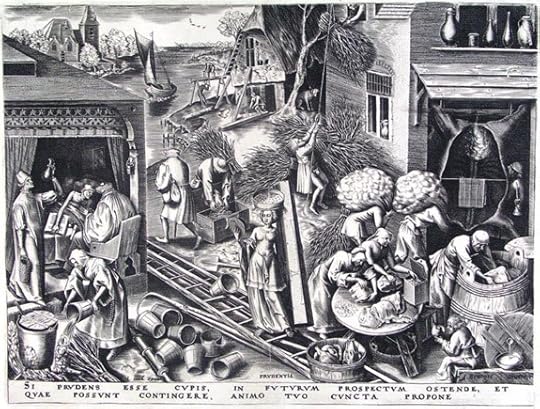
"Prudentia" by Pieter Bruegel the Elder (mid-16th century)
Parables, Puzzlement, and Prudence | A Scriptural Reflection on the Readings for September 22, 2013 | Carl E. Olson
Readings:
• Am 8:4-7
• Ps 113:1-2, 4-6, 7-8
• 1 Tm 2:1-8
• Lk 16:1-13
How difficult is the parable of the
dishonest steward, heard in today’s Gospel reading? “Of all of
Jesus’ parables,” writes New Testament scholar Dr. Craig L.
Blomberg in Preaching the Parables (Baker Academic, 2004), “this is probably the most puzzling. It is certainly the
one on which more scholarly ink has been spilled than any other.”
There may be no need for “probably”;
in my opinion, this is the most puzzling of the parables. The parable
has a similar structure to the parable of the unforgiving, or
ungrateful, steward (Matt 18:23-35; Lk. 7:41-43), with three levels
of social status: the master, the steward, and the debtors. But
whereas the parable of the unforgiving steward is straightforward in
its moral message—if you wish to receive forgiveness, you must
extend forgiveness—the moral and message of the parable of the
dishonest steward is not immediately clear.
First, the steward, who has misused his
master’s money and so faces the loss of job and status, uses
dishonest means in order to open doors for future prospects. He
doesn’t admit his guilt, ask for forgiveness, or attempt to make
matters right. Secondly, having changed the amounts due on the
promissory notes (and thus ingratiating himself to the debtors), the
steward is—shockingly—commended by his master. Why?
Because he had, Jesus said, acted prudently.
At this point,
many readers might understandably move from being puzzled to being
perplexed. It seems that Jesus not only presented a parable condoning
dishonest and self-serving behavior, but had actually praised it! But
St. Augustine, in preaching upon this parable, stated that Jesus
“surely did not approve of that cheat of a servant who cheated his
master, stole from him and did not make it up from his own pocket.”
So why, he asked, “did the Lord put this before us”? We must be
careful to not miss what Jesus indicated was a key point of the
parable: “For the children of this world are more prudent in
dealing with their own generation than are the children of light.”
And, in fact, Augustine writes that the
parable is not meant to praise the sins of the steward but to extol
him “because he exercised foresight for the future. When even a
cheat is praised for his ingenuity, Christians who make no such
provision blush.” Put simply, the parable extols shrewdness and
ingenuity, and urges Christians to employ them for the sake of the
Kingdom. It is very much a commentary on Jesus’ statement, “Behold,
I am sending you like sheep in the midst of wolves; so be shrewd as
serpents and simple as doves” (Matt. 10:16). The Greek word denotes
the virtue of prudence, that virtue which “disposes practical
reason to discern our true good in every circumstance and to choose
the right means of achieving it” (Catechism of the Catholic
Church, 1806).
Unfortunately, we can sometimes reject
such shrewdness and prudence out of a sense of false piety, naivety,
or fearfulness. Yet the Catechism, in speaking of prudence,
says it “is not to be confused with timidity or fear, nor with
duplicity or dissimulation.” As children of the light, we should
seek to use every good and moral means available to us to build up
the Kingdom of God, to proclaim the Gospel, and to defend the
Catholic Faith. Yet, if we are honest, we recognize how timid and
unsure we often are, especially in the face of the questions and
attacks presented by the children of this world. “Instead of being
as shrewd as serpents and as innocent as doves,” Blomberg rightly
states, “we become as wicked as serpents and as dumb as doves!”
In
order to have and to increase prudence, we should always keep in mind
Jesus’ concluding exhortation: “No servant can serve two
masters.” Prudence is “right reason in action,” which means it
is rooted in right priorities and the knowledge that we are not of
this world, but are children of light and children of God.
(This "Opening the Word" column originally appeared in the September 19, 2010, edition of Our Sunday Visitor newspaper.)
September 20, 2013
New Pope, Good Interview, Old Story
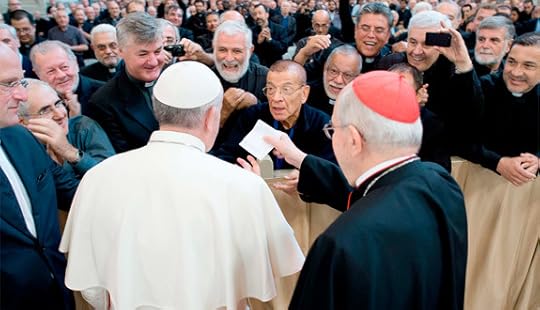
New Pope, Good Interview, Old Story | Carl E. Olson | Editorial | Catholic World Report
Secularist
journalists and progressive Catholics try to make hay to feed their
obsessions
Judging
by some of the reactions to the
September 19th America interview with Pope
Francis, which was originally conducted over three days in August,
you might be tempted to think a pontiff had never given an interview
before. How quickly some forget, if they ever knew at all.
The
first papal text I ever read, as a young Evangelical Protestant with
a growing curiosity about the Catholic Church, was John Paul II's
1994 book, Crossing the Threshold of Hope (available
online in PDF format), which was an interview conducted by
Italian journalist Vittorio Messori. And, of course, Pope Benedict
XVI was interviewed in 2010 by German journalist Peter Seewald,
resulting in Light of the World: The Pope, the Church, and the
Sign of the Times (Ignatius Press, 2010). That book certainly
garnered widespread attention, especially for comments that Benedict
made about contraception.
In
fact, if you read only accounts from many mainstream news sources,
you may have concluded that the entire book was about condoms. The
obsession with the “condom comments” became so ridiculous that
the president of Ignatius Press, Mark Brumley, penned
an interview with himself which satirized the nonsense:
Mainstream
Media: So the Pope has written a book about condoms!
Mark
Brumley: Well, actually, it’s an interview book. And
journalist Peter Seewald interviewed Benedict about a wide-range of
topics, not just about condoms.
MM: Yes,
but condoms must be a major theme of the book. Look at all the
coverage that has focused on condoms!
Mark: Actually,
the Pope’s comments about condoms cover only about two pages out of
about 200 pages of Q & As.
MM: Well,
what did the Pope say about condoms?
Mark: You
can go
here and read for yourself what
he said.
What
does this have to do with the interview with Pope Francis? Quite a
bit. Consider some of the headlines that a Google search turns up
for “Pope Francis” and “interview” (all from the first page
):
September 19, 2013
Catholics, the Environment, and a “Culture of Waste”

Catholics, the Environment, and a “Culture of Waste” | J. J. Ziegler | Catholic World Report
Recent popes have highlighted the necessity of caring for the environment—but how does what they say differ from secular environmentalism?
On June 5, Pope Francis devoted his
Wednesday general audience to the environment. Decrying the “culture of
waste,” he linked disrespect for the environment to disrespect for human life:
This “culture of waste” tends to become a
common mentality that infects everyone. Human life, the person, are no longer
seen as a primary value to be respected and safeguarded, especially if they are
poor or disabled, if they are not yet useful—like the unborn child—or are no
longer of any use—like the elderly person.
Pope Francis’s concern about the environment is not novel:
Venerable Paul VI reflected on the topic in Octogesima
Adveniens (no. 21), his 1971
apostolic letter on the 80th anniversary of Pope Leo’s XIII’s landmark social
encyclical Rerum Novarum.
Early in his pontificate, in his 1979 apostolic letter Inter Sanctos, Blessed John Paul II
proclaimed St. Francis of Assisi the heavenly patron of those who promote
ecology. At various points in his pontificate, John Paul directed his attention
to ecological concerns, most significantly in his 1987 encyclical Sollicitudo
Rei Socialis (nos. 26, 34), his 1990 Message
for the World Day of Peace, and his 1991 encyclical Centesimus
Annus (nos. 37-40), in which he linked the environment to a “human
ecology” whose “first and fundamental structure” is “the family founded on
marriage” (no. 39).
It was Pope Benedict, however, who earned the nickname “the
green pope,” in part because of the installation of solar panels above some
Vatican buildings and in part because of the Vatican’s attempt, which
proved ill-fated, to become the world’s first carbon-neutral nation.
Of more enduring significance is Pope Benedict’s teaching
on the environment, most significantly his 2009 encyclical Caritas
in Veritate (nos. 48-52) and his 2010 Message
for the World Day of Peace. The pope emeritus reflected on ecology in a
number of speeches as well, from his 2008
address to the Roman Curia, in which he discussed creation and gender, to
his 2010 “state
of the world” address to the diplomatic corps, in which he said that
concern and commitment for the environment
should be situated within the larger framework of the great challenges now
facing mankind. If we wish to build true peace, how can we separate, or even
set at odds, the protection of the environment and the protection of human
life, including the life of the unborn? It is in man’s respect for himself that
his sense of responsibility for creation is shown.
“Today, more than ever, it appears clear to us that respect
for the environment cannot fail to recognize the value and inviolability of the
human person in every phase of life and in every condition,” he likewise said in
a 2011 address. “Respect for the human being and respect for nature are one
and the same, but they will both be able to develop and to reach their full
dimension if we respect the Creator and his creature in the human being and in
nature.”
Pope Francis and the Missionary Spirit
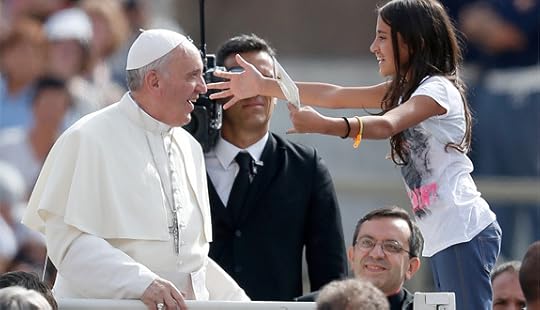
Pope Francis and the Missionary Spirit | Fr. James V. Schall, S.J. | CWR
We are called to preach and proclaim the Gospel “courageously and in every situation.”
“The
Church—I repeat once again—is not a relief organization, an
enterprise nor an NGO (Non-Government Organization), but a community
of people, animated by the Holy Spirit, who have lived and are living
the wonder of the encounter with Jesus Christ and want to share their
experience of deep joy, the message of salvation that the Lord gave
us. It is the Holy Spirit who guides the Church in this path.”
— Pope
Francis, Message
for World Day of Peace (L’Osservatore Romano, August 28,
2013)
I.
In
contrast with his usual custom of keeping what he says brief and to
the point, Pope Francis wrote a fairly long message (about one full
page in L’Osservatore Romano) for Mission Sunday, which will
be observed on October 20, 2013. This letter is rather wide ranging.
It strikes me as giving more insight into what Pope Bergoglio is
about than almost anything I have previously come across, except
perhaps Lumen Fidei.
This
Pope’s evident optimism has always puzzled me because he does have,
at the same time, a pretty good grasp of the real and growing
obstacles to the presence of Christianity in almost every sector of
the world and its culture. Near the end of this Message, for
instance, Pope Francis tells us:
I wish to say a word about those Christians, who, in various parts of
the world, encounter difficulty in openly professing their faith and
in enjoying the legal right to practice it in a worthy manner. They
are our brothers and sisters, courageous witnesses—even more
numerous than the martyrs of the early centuries—who endure with
apostolic perseverance many contemporary forms of persecution. Quite
a few also risk their lives to remain faithful to the Gospel of
Christ.
We do not
hear of President Obama or other political leaders drawing “red
lines” about such persecution of Catholics. Evidently, the
persecution of Christians is not a public or world problem. Indeed,
for all too many, Christianity, particularly Catholicism, is the
world problem, best to marginalize it or, better, to eliminate it.
The Pope
does not give any names of those who do the persecuting. I am not
happy about this. But I understand that, if you mention persecution,
especially in Islamic states, Christians are then persecuted with
greater force. You are blamed for it. Very few places can be found in
the world where Catholicism can be freely, openly, and legally
present. The fact is that also in the so-called democracies, the
prevalent mood of the public order is to reduce religion to the
exclusively private sphere with no presence allowed in education,
health, culture or other normal areas of human life.
The Pope
seems aware of these issues but he remains relatively unconcerned
about them. He has an approach to the world through worship,
community, and joy that is not deterred by what in fact are huge and
growing problems that can only properly be designated as persecution.
September 18, 2013
20% off Great New Titles from Ignatius Press!

20% off Great New Titles from Ignatius Press!
Offer ends Wednesday September 25th, 2013 at 12:00 midnight EST.
These prices are available online only through Ignatius.com
Ignatius Press and Lighthouse Catholic Media want to offer you
the opportunity to change a life with a single dollar.
Find out how here.
New Titles
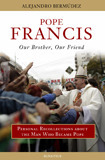 Pope Francis: Our Brother, Our Friend
Pope Francis: Our Brother, Our Friend
Personal Recollections about the Man Who Became Pope
Alejandro Bermúdez
This fascinating new look at Pope Francis presents the personal
insights of ten Jesuits, many who have known him since his first days as
a Jesuit, and were interviewed for this book shortly after he was
elected the Pope. Some were his professors, some his peers, and some
younger Jesuits who were his students. Also interviewed for this book
are non-Jesuits, including an Argentine senator, a prominent rabbi, a
priest working in the slums of Buenos Aires that Bergoglio often
visited. Also available as an e-book. Regular price: $19.95, sale price: $15.96
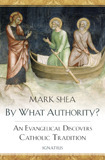 By What Authority?
By What Authority?
An Evangelical Discovers Catholic Tradition
Mark Shea
In this newly updated, expanded version of his popular work of
apologetics, Shea presents a lively and entertaining look at his
conversion to Catholicism from Evangelicalism and his discovery of
Christian tradition. As an Evangelical, Shea accepted the principle of
"sola scriptura" (Scripture alone) as the basis of faith. Now as a
Catholic convert, he skillfully explains how and why Sacred Tradition
occupies a central role in Divine Revelation. Also available as an e-book. Regular price: $16.95, sale price: $13.56
"A
crystal clear and compelling case for Sacred Tradition, on the basis of
logic, history and Scripture. It is simply the best I have found."
- Scott Hahn, Author, Rome Sweet Home
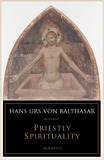 Priestly Spirtuality
Priestly Spirtuality
Hans Urs von Balthasar
Again and again, in his theological
writings, Hans Urs von Balthasar has addressed the fundamental issues of
office and ministry, of priesthood and discipleship. He has uncovered
the foundations from a biblical and theological historical perspective
and has offered answers to the current problems of priestly existence.
This book presents the confrontation with relevant trends, and at the
same time the opposing current generated by von Balthasar, since he does
not follow popular positions but instead gives us the very core of the
Gospel and of revelation, like rye bread. Regular price: $14.95, sale price: $11.56
"If
prayed with and discussed openly among seminary formators, this book
carries the potential to reground all contemporary priestly formation in
deep intimacy with the mysteries of Christ."
- Rev. Richard J. Gabuzda, Executive Director, The Institute for Priestly Formation
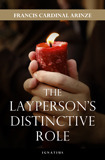 The Layperson's Distinctive Role
The Layperson's Distinctive Role
Cardinal Francis Arinze
The call of lay people to be witnesses of Christ in the ordinary areas
of secular life, such as family, work, recreation, politics and
government, shows how demanding the apostolate of the lay people is. The
book draws from the dynamic teachings of the Second Vatican Council,
the riches of the 1987 Synod of Bishops on the Lay Faithful, and the
emphasis on the lay apostolate by recent Popes, to present to lay people
an attractive and demanding call to witness to Christ in society. Also available as an e-book.
Regular price: $9.95, sale price: $7.96
"The
layperson is a layperson and has to live as a layperson with the power
of baptism, which enables him to be a leaven of the love of God in
society itself, to create and sow hope, to proclaim the faith, not from a
pulpit but from his everyday life. And, like all of us, the layperson
is called to carry his daily cross — the cross of the layperson, not of
the priest.” - Pope Francis
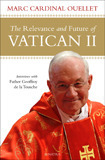 The Relvance and Future of the Second Vatican Council
The Relvance and Future of the Second Vatican Council
Cardinal Marc Ouellet
Fifty years after the opening of the
Second Vatican Council, Cardinal Marc Ouellet-considered by many to have
been a top candidate to succeed Pope Benedict XVI-gives his thoughts on
the Council and what the Vatican II means for us today. In interviews
with French priest Fr. Geoffroy de la Tousche, Cardinal Ouellet speaks
both personally and professionally about the state of the Church since
the Council, explaining what went wrong-and right-in the implementation
of the Council's teachings. Also available as an e-book. Regular price: $16.95, sale price: $13.56
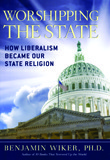 Worshipping the State
Worshipping the State
How Liberalism Became Our State Religion
Benjamin Wiker
Many Christians feel that they are being
opposed at every turn by a well-orchestrated political and cultural
campaign to de-Christianize every aspect of Western culture. They are
right, and it goes even further back than the Obama Administration.
Benjamin Wiker argues that it is liberals who seek to establish an
official state religion: one of unbelief. He reveals that it was never
the intention of the Founders to drive religion out of the public square
with the First Amendment, but secular liberals have deliberately
misinterpreted the establishment clause to serve their own ends: the
de-Christianization of Western civilization. Regular price: $27.95, sale price: $22.36
"Wiker's
book is the most forthright and unblinking analysis yet of the
ubiquitous assault on religion in American society. Every believer in
religious liberty should read it."
- James Hitchcock, author, History of the Catholic Church
 Praying with Saint John's Gospel
Praying with Saint John's Gospel
Fr. Peter John Cameron, OP, Editor
Delve deeply into John's Gospel, which is read on major feast days of
every liturgical year. Praying with St. John's Gospel presents a
clear-cut and effective way to meditate daily on Saint John's Gospel.
With an entry for each day of the calendar year, you will read the
entire Gospel within one year! Each entry includes: a short quotation
from Saint John's Gospel, an original, down-to-earth reflection composed
by one of the book's twenty-five gifted spiritual authors, and a
thought-provoking final prayer.
Regular price: $12.95, sale price: $10.36
New: "Reasonable Pleasures: The Strange Coherences of Catholicism" by Fr. James Schall, SJ
Now available:
Reasonable Pleasures: The Strange Coherences of Catholicism
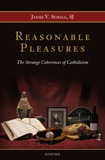
by Fr. James V. Schall, SJ
• Also available in Electronic Book Format
The fact of pleasure is obvious to us, but its relation to reason is
less understood. We are beings who laugh and run, sing and dance, but
we too seldom reflect on why we do these things. Above all, we are
beings who think and who want to know whether our lives make sense.
In this thought-provoking study of the relationship between our reason
and our experience of pleasure, popular professor and author Fr. James
Schall shows how reason, religion and pleasure are not in conflict with
one another. Religion has to do with how man relates to God. Catholicism
is not so much a religion as a revelation. It records and recalls how
God relates to man.
The popular mood of our time is that neither religion nor revelation has
much to do with real life. Yet when we look at things as having meaning
and order, they fit together in surprising ways. This coherence should
bring us joy, and teach us how reason, religion and pleasure can work
together for our benefit. Schall shows us in this book why we have many
reasons to think that our lives make sense, that our pleasures can be
reasonable, and our reason itself is a pleasure.
James V. Schall, S. J., was a popular and highly
regarded Professor of Political Philosophy for many years at Georgetown
University until his retirement in 2012. His previous books include Another Sort of Learning, Idylls and Rambles, The Life of the Mind, At the Limits of Political Philosophy, and The Order of Things.
Praise for Reasonable Pleasures:
"A timely treatise when the sources of our being, and of our culture,
are challenged on a daily basis. Steeped in classical learning, Schall
shows the value of a Catholic mind filled with the wisdom of the past,
in addressing the relativism and skepticism of the present. Schall is
one of the foremost Catholic intellectuals of our day."
- Jude P. Dougherty, Dean, School of Philosophy, Catholic University of America
"With the inspiration of Plato and other great sages, it is indisputable
that the greatest contemporary guide of What Is is James V. Schall, as
this book so beautifully, cogently, and accessibly demonstrates on every
page."
- Patrick J. Deneen, University of Notre Dame
"This is Schall at his best-learned, witty, and profound. He reminds us
that existence and our deepest selves have an underlying unity that can
be discovered with reason and grace."
- Gerald Russello, Editor, University Bookman
"The book's chapters on hell, eternal life, and dogma are worth the read in themselves."
- Raymond Dennehy, Professor of Philosophy, University of San Francisco
"A bracing antidote to the disorientation of modernism that casts Man as
an intruder in the universe . . . delivered in Fr. Schall's inimitable
style-serious matters wrapped in wit and wisdom."
- Mary Jo Anderson, Author, Male and Female He Made Them
"Schall brilliantly leads his readers to discover the ‘reasonable
pleasures' found in the mind's ability to know truth. The book is
suffused with the joy of learning and, above all, the joy of
contemplation and worship."
- Christopher Cullen, S.J., Fordham University
"Schall points towards real joy in a world going through gloomy times-Christian dogma as the soul of true wit."
- Joseph Wood, Institute of World Politics
"[A]ll evangelizers proclaim Christ, but Catholic evangelizers proclaim a Eucharistic Christ.”
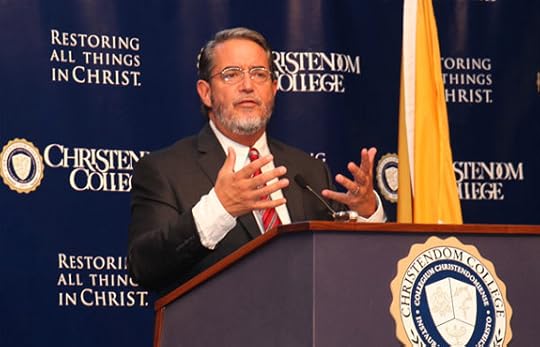
Earlier this week, noted Scripture scholar and author Dr. Scott Hahn (see Ignatius Press books authored and co-authored by Dr. Hahn) delivered the inaugural lecture in Christendom College’s Major Speaker Program, entitled, “The Bible, the Eucharist, and the New Evangelization.” The press release from Christendom College provides some highlights from Hahn's address:
The entire lecture can be downloaded at Christendom on iTunes U, christendom.edu/itunesu. This past April, America magazine published an article by Hahn, "Mass Evangelization", which covers much of the same material. In that piece, Hahn wrote,
scholar and author Dr. Scott Hahn (see Ignatius Press books by and edited by Dr. Hahn) delivered the inaugural lecture in Christendom College’s Major Speaker Program, entitled, “The Bible, the Eucharist, and the New Evangelization.” The press release from Christendom College provides some highlights from Hahn's address:
“We face the task of re-evangelizing the de-Christianized,” Hahn said. “The cause of de-Christianization has been this oppressive secularization, which doesn’t just cause us to forget the faith, but it causes us to become more and more distant from those structures that make it real.”
Hahn explained that just as human love and relationships lead to a sacrament—Matrimony—so too does our love and relationship with God lead to a sacrament—the Eucharist. He noted that it was Blessed Pope John Paul who first called for the new evangelization to be based on the Eucharist and, citing and a paper by Cardinal Francis George of Chicago, he said, “all evangelizers proclaim Christ, but Catholic evangelizers proclaim a Eucharistic Christ.”
“But there is something else that is new about the new evangelization,” Hahn said. “It isn’t just for clergy. It isn’t just for missionaries. It isn’t just for those who go out to the foreign lands. It’s for each and every single one of us. Not only to go out and share the faith, but also to allow ourselves to be evangelized and converted.”
Hahn debunked the myth that St. Francis said, “preach the Gospel at all times and use words when necessary,” saying that there is no proof or historical record of the saint saying those words to his friars.
“I would want to say this to those who use that as an excuse,” he continued. “Just look in the mirror some evening and ask yourself, ‘Am I so upright, so virtuous, so compelling that all people really need to do is just keep their eyes on me and my life and that should be sufficient to give them the grace of conversion?’ Before you answer that question yourself, ask your spouse or your roommate. You may be in for a surprise.”
Hahn said that Catholics must not only recognize their need to evangelize, but also their need to be evangelized themselves in their family life and marriages.
“Conversion is life long,” he said. “It is ongoing. It is ever deepening. It is daily. And it is also difficult.”
Concluding, Hahn said that all Catholics are involved in the new evangelization, but very few Catholics are going to be equipped like Christendom students.
“Very few Catholics are ever going to be launched like Christendom grads,” he said. “Let me just ask you those old questions: if you don’t, who will? And if you wait, when will it happen? And if you say ‘yes,’ I got to tell you, stand back and watch, because God wants to do more through us than we want Him to do.”
He encouraged the students to study and pray hard and to take all that they have gained from the college out into the world.
“What you are learning here is what the world is dying for,” he said. “I hope that none of you ever get to the point where you take it for granted. This is one of the largest slices of heaven on earth.”
The entire lecture can be downloaded at Christendom on iTunes U, christendom.edu/itunesu. This past April, America magazine published an article by Hahn, "Mass Evangelization", which covers much of the same material. In that piece, Hahn wrote,
Carl E. Olson's Blog
- Carl E. Olson's profile
- 20 followers



